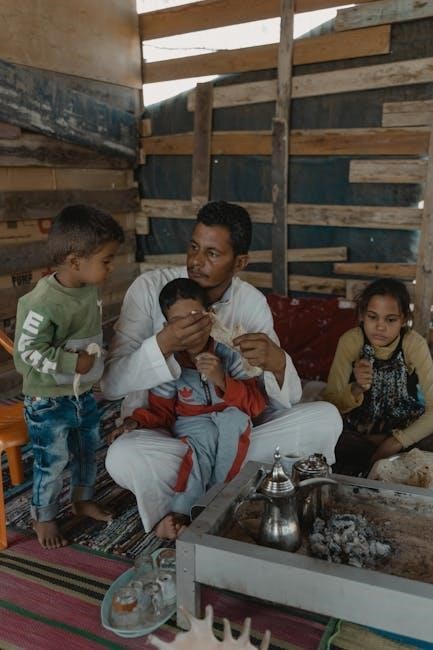Guiding Light Sober Living provides a supportive sanctuary for individuals overcoming addiction, offering housing, counseling, and job placement services․ Their mission emphasizes fostering long-term recovery through community and accountability, relying on donations to sustain life-changing programs․
1․1 History and Mission of Guiding Light Sober Living
Founded in 1929, Guiding Light Sober Living has a rich history of supporting individuals in recovery; Originally established as a nonprofit organization, its mission revolves around providing a safe, structured environment for men and women transitioning from addiction to independence․ Over the years, it has helped thousands achieve sobriety and reintegration into society․ The organization emphasizes long-term recovery through community engagement, accountability, and holistic support․ Its mission is rooted in empowering individuals to rebuild their lives, fostering resilience, and creating a foundation for lasting change․
1․2 The Importance of Sober Living in Recovery
Sober living is a critical bridge between addiction treatment and independent life, offering a safe, supportive environment for individuals to heal and grow․ It provides time to develop coping strategies, rebuild relationships, and establish a routine free from substances․ The structured setting fosters accountability and reduces relapse risks by surrounding residents with like-minded peers․ For many, sober living is essential for transitioning back to society, helping them regain stability and confidence․ Guiding Light Sober Living emphasizes this transitional phase, ensuring a strong foundation for long-term recovery and personal growth․

Structure and Programs Offered
Guiding Light Sober Living offers structured residential programs, daily routines, counseling, and support services, along with job placement and educational opportunities to foster recovery and independence․
2․1 Residential Programs and Daily Routine
Guiding Light Sober Living offers structured residential programs with a focus on creating a disciplined and supportive environment․ Residents engage in daily routines that include morning meetings, chores, and meals․ The program emphasizes accountability, with rules such as curfews and regular drug testing to ensure a safe space․ Daily schedules often include counseling sessions, group activities, and time for personal reflection․ The goal is to provide a stable foundation for recovery, helping residents build healthy habits and a sense of responsibility․
2․2 Counseling and Support Services Available
Guiding Light Sober Living provides comprehensive counseling and support services to aid residents in their recovery journey․ Individual and group therapy sessions are offered, focusing on addressing underlying issues and developing coping strategies․ Peer support groups and mentorship programs foster a sense of community and shared experience․ Trained staff and counselors work closely with residents to create personalized plans, ensuring emotional and psychological well-being․ These services aim to empower individuals, helping them maintain sobriety and build a strong foundation for long-term recovery and personal growth․

Benefits of Sober Living Environment
A sober living environment fosters a supportive community, promoting accountability and structure․ Residents benefit from shared experiences, reducing isolation and enhancing motivation for sustained recovery and personal growth․
3․1 Peer Support and Community Engagement
Peer support is a cornerstone of Guiding Light Sober Living, fostering a sense of belonging and shared purpose․ Residents engage in group activities, workshops, and community events, building strong bonds and mutual encouragement․ This collaborative environment helps individuals stay motivated and accountable, while also connecting them to a broader network of support․ By actively participating in the community, residents develop essential life skills and gain confidence, which are critical for long-term recovery and reintegration into society․
3․2 Accountability and Relapse Prevention Strategies
Guiding Light Sober Living emphasizes accountability through structured routines and regular check-ins, ensuring residents stay on track with their recovery goals․ Relapse prevention strategies include motivational interviewing, coping skill development, and identifying triggers․ Residents are encouraged to participate in group sessions and one-on-one counseling to address challenges proactively․ By fostering a culture of responsibility and providing tools for sustainable sobriety, Guiding Light helps individuals build resilience and prepare for independent living, reducing the risk of relapse and promoting long-term success․
Services Beyond Sober Living
Guiding Light offers comprehensive support, including job placement, educational programs, and skill-building workshops, empowering residents to achieve independence and reintegrate successfully into society․
4․1 Job Placement and Employment Assistance
Guiding Light Sober Living provides robust job placement and employment assistance to help residents achieve financial stability․ Programs include resume building, interview preparation, and job search support․ Partnerships with local businesses create opportunities for residents to gain meaningful employment․ These efforts focus on fostering independence and self-sufficiency, which are crucial for long-term recovery․ Donations play a vital role in sustaining these initiatives, ensuring residents can successfully transition back into society․ Employment assistance is a cornerstone of their comprehensive support system․
4․2 Educational and Skill-Building Opportunities
Guiding Light Sober Living offers educational and skill-building programs to empower residents for independent living․ These include life skills training, GED preparation, and vocational workshops․ Residents gain essential skills such as financial literacy, cooking, and time management․ Donations support these programs, ensuring access to resources like computers and educational materials․ By fostering personal growth and self-sufficiency, Guiding Light equips individuals with the tools needed to thrive beyond their recovery journey․ These opportunities are integral to their holistic approach to sobriety and reintegration into society․
Community Involvement and Partnerships
Guiding Light collaborates with local recovery organizations and hosts community events to foster connections and support․ These partnerships strengthen outreach programs, benefiting both residents and the community․
5․1 Collaboration with Local Recovery Organizations
Guiding Light Sober Living actively collaborates with local recovery organizations to enhance its services․ By partnering with groups like Recover All Supportive Services and Gods Love for Women, they expand access to resources, counseling, and skill-building programs․ These collaborations strengthen the support network for residents, fostering a cohesive community approach to recovery․ Such partnerships not only enrich the sober living experience but also contribute to the broader recovery ecosystem in Grand Rapids․
5․2 Community Events and Outreach Programs
Guiding Light Sober Living hosts community events and outreach programs to foster connection and awareness․ These include workshops, open houses, and support groups, which are open to the public․ By engaging the community, they build trust and reduce stigma around recovery․ Events often feature guest speakers, educational sessions, and opportunities for residents to share their journeys․ Outreach programs also involve partnerships with local businesses and organizations to promote sobriety and provide resources to those in need, furthering Guiding Light’s mission of empowerment and healing․

Success Stories and Testimonials
Guiding Light Sober Living has transformed countless lives, with residents achieving sobriety, rebuilding families, and gaining employment․ Testimonials highlight the program’s life-changing impact and supportive environment․
6․1 Resident Experiences and Achievements
Residents at Guiding Light Sober Living often share inspiring stories of personal growth and transformation․ Many achieve long-term sobriety, secure stable employment, and rebuild their lives․ The supportive environment fosters resilience, with residents actively engaging in community activities and skill-building programs․ Testimonials highlight how the program’s structure and resources have empowered individuals to overcome addiction, restore family relationships, and regain independence․ These achievements underscore the program’s effectiveness in helping residents thrive beyond their time in sober living․
6․2 Impact on Families and Communities
Guiding Light Sober Living positively impacts families by restoring relationships and fostering stability․ Residents often reunite with loved ones, creating healthier home environments․ The program also benefits communities by reducing crime and public disturbances associated with addiction․ Sober living environments promote productivity, as residents gain employment and contribute to society․ Community events and partnerships further strengthen ties, showcasing the transformative power of recovery and inspiring hope for those affected by addiction․

Challenges in Sober Living
Residents face challenges like relapse triggers, social pressures, and maintaining discipline․ Overcoming these obstacles requires strong support systems and commitment to long-term recovery goals․
7․1 Common Obstacles Residents Face
Residents often encounter challenges such as relapse triggers, social pressures, and adjusting to a structured routine․ Financial instability and rebuilding trust with families are additional hurdles․ These obstacles require resilience, support, and practical strategies to navigate successfully․
7․2 Strategies to Overcome Relapse Triggers
Guiding Light Sober Living employs evidence-based strategies to help residents manage relapse triggers․ These include peer support groups, counseling sessions, and motivational interviewing techniques․ Residents learn coping mechanisms and stress management skills to maintain sobriety․ Regular accountability checks and a structured daily routine also play a crucial role in preventing relapse․ By addressing emotional and environmental triggers, residents build resilience and develop sustainable recovery habits․
The Role of Donations and Support
Donations and community support are vital for Guiding Light Sober Living, enabling them to provide free addiction rehab, housing, and job placement services․ Contributions ensure sustained recovery programs․
8․1 How Donations Impact the Program
Donations are the lifeblood of Guiding Light Sober Living, directly funding essential services like housing, counseling, and job training for individuals in recovery․ These contributions ensure the program remains free of charge, breaking down financial barriers for those seeking help․ Donations also enable the organization to expand its resources, such as mental health workshops and skill-building activities, which are crucial for long-term sobriety․ By supporting recovery programs, donations empower residents to rebuild their lives and become self-sufficient members of their communities․
8․2 Ways to Contribute and Volunteer
Volunteering at Guiding Light Sober Living offers meaningful opportunities to support recovery efforts․ Individuals can mentor residents, lead workshops, or assist with daily operations․ Donations of goods, such as food or toiletries, also make a significant impact․ Monetary contributions fund critical services, while volunteering provides direct, hands-on support․ Every contribution helps create a nurturing environment for residents to thrive․ By giving time or resources, individuals empower those in recovery to rebuild their lives and achieve lasting success․
Guiding Light Sober Living is a sanctuary fostering recovery through community support and accountability, relying on donations to sustain life-changing programs․ A vital resource in the journey toward lasting sobriety․
9․1 The Future of Guiding Light Sober Living
Guiding Light Sober Living aims to expand its reach by opening new facilities and strengthening partnerships with local organizations․ By enhancing its programs and increasing accessibility, the organization plans to support more individuals in their recovery journey․ Future initiatives include expanding job placement services and educational opportunities to empower residents for long-term success․ With continued community support and donations, Guiding Light Sober Living will remain a vital resource for fostering sustainable recovery and transforming lives․
9․2 Final Thoughts on the Importance of Sober Living
Sober living is a cornerstone of sustained recovery, offering a structured environment that fosters accountability and personal growth․ At Guiding Light, the emphasis on community support and relapse prevention strategies empowers individuals to build lasting change․ By addressing the whole person—mind, body, and spirit—sober living homes provide a foundation for long-term success․ The importance of such programs lies in their ability to bridge the gap between treatment and independent living, equipping residents with the tools and confidence to thrive in society․

